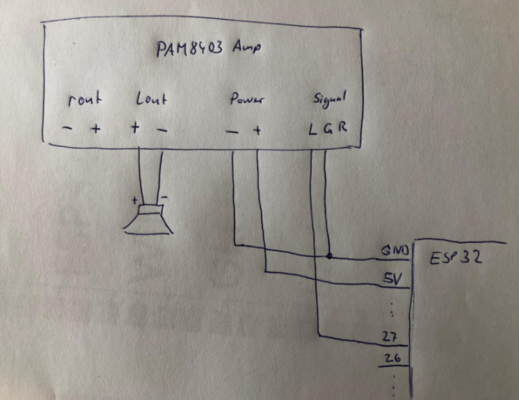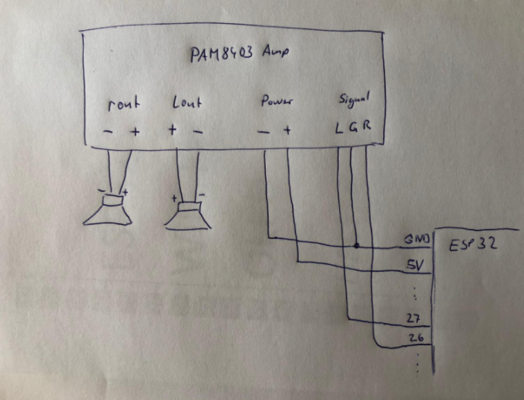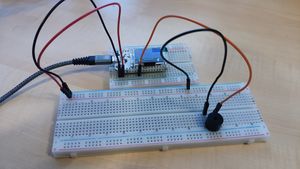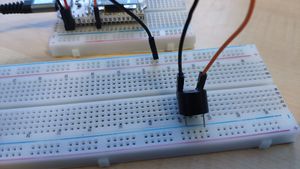PAM8403 Stereo Amplifier: Difference between revisions
Jump to navigation
Jump to search
| Line 9: | Line 9: | ||
= How to connect it electrically = | = How to connect it electrically = | ||
[[File:Mono.PNG| | [[File:Mono.PNG|x400px]] | ||
[[File:Stereo.PNG|x400px]] | |||
[[File:Stereo.PNG| | |||
= How to control it in MicroPython = | = How to control it in MicroPython = | ||
Revision as of 14:32, 29 August 2020
Description
An amplifier can be used to driver bigger speakers and to generate sound that is louder.
The amplifier is connected (similar to a speaker) to the ESP32/ESP8266, it is also connected to power, and then it has connections for the speakers.
How to connect it electrically
How to control it in MicroPython
Basic code to generate a 500 Hz signal
creating a mono singnal with 500Hz on Pin 27 (connected to the left channel)
from machine import Pin
from time import sleep, sleep_us, sleep_ms
# assume our amplifier is connected to Pin 27, we use it as output
myLED = Pin(27, Pin.OUT)
#generate a 500Hz on/off signal
while True:
# this switcheson for 1ms = 1000 us
myLED.on()
sleep_us(1000)
# this switches off for 1 ms = 1000 us
myLED.off()
sleep_us(1000)Code to play a melody - decoding notes
Example code shows how you can play a melody with the speaker. If you want to add higher notes see https://en.wikipedia.org/wiki/Piano_key_frequencies for the needed frequency. The example code was taken and edited from https://micropython-on-esp8266-workshop.readthedocs.io/en/latest/basics.html#beepers.
There are some issues with restarting PWM outputs - see Known Issues.
# beeper code from https://micropython-on-esp8266-workshop.readthedocs.io/en/latest/basics.html#beepers
from machine import Pin, PWM
from time import sleep
tempo = 4
#notes and corresponding frequency
tones = {
'c': 262,
'd': 294,
'e': 330,
'f': 349,
'g': 392,
'a': 440,
'b': 494,
'C': 523,
' ': 0,
}
pin = Pin(27, Pin.OUT)
# Init Beeper without frequency.
beeper = PWM(pin, duty=512)
melody = 'cdefggaaaagaaaagffffeeddddc'
rhythm = [8, 8, 8, 8, 4, 4, 8, 8, 8, 8, 4, 8, 8, 8, 8, 4, 8, 8, 8, 8, 4, 4, 8, 8, 8, 8, 4]
for tone, length in zip(melody, rhythm):
beeper.freq(tones[tone])
sleep(tempo/length)
beeper.deinit()Related Tutorial Videos






